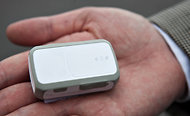Follow up on Supreme Court gps+privacy case
/From the NYTimes. Police Are Using Phone Tracking as a Routine Tool. By ERIC LICHTBLAU, Published: March 31, 2012.
Law enforcement tracking of cellphones, once the province mainly of federal agents, has become a powerful and widely used surveillance tool for local police officials, with hundreds of departments, large and small, often using it aggressively with little or no court oversight, documents show.
 A GPS tracker. The Supreme Court recently ruled that such a device placed on a suspect's car was an unreasonable search.
A GPS tracker. The Supreme Court recently ruled that such a device placed on a suspect's car was an unreasonable search.
The Supreme Court recently ruled that such a device placed on a suspect's car was an unreasonable search (but sidestepepd the question of how to treat information gathered from devices installed by the manufacturer and how to treat information held by third parties like cellphone companies). The practice has become big business for cellphone companies, too, with a handful of carriers marketing a catalog of “surveillance fees” to police departments to determine a suspect’s location, trace phone calls and texts or provide other services. Some departments log dozens of traces a month for both emergencies and routine investigations.
With cellphones ubiquitous, the police call phone tracing a valuable weapon in emergencies like child abductions and suicide calls and investigations in drug cases and murders. One police training manual describes cellphones as “the virtual biographer of our daily activities,” providing a hunting ground for learning contacts and travels.